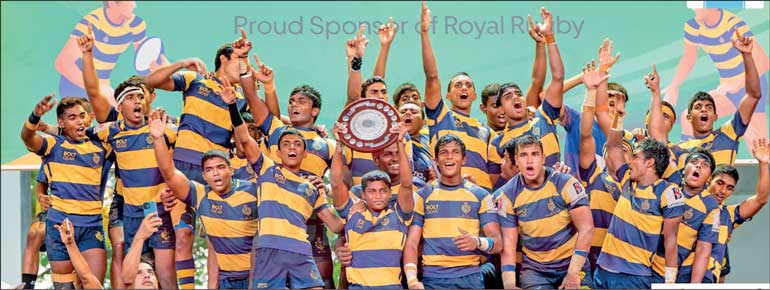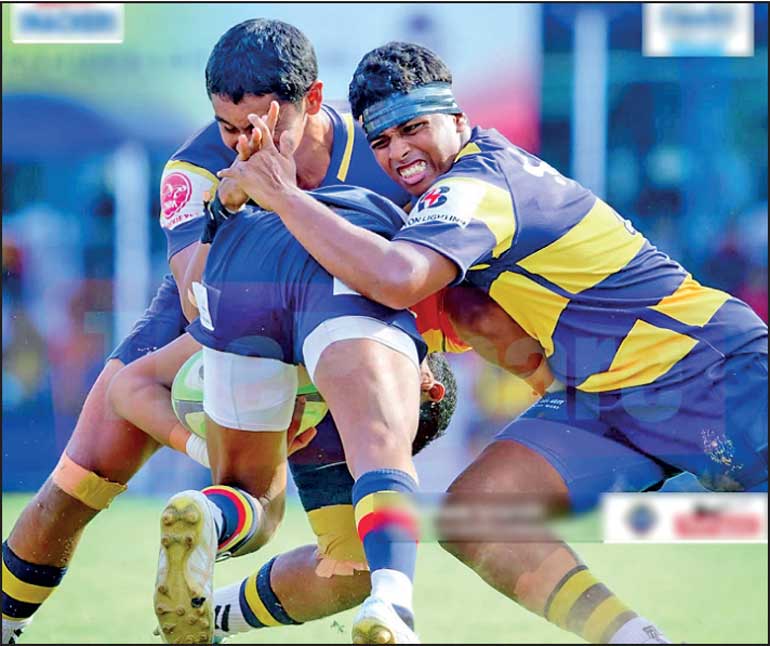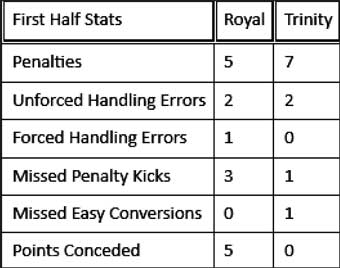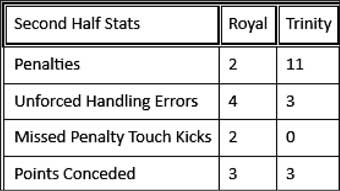Tuesday Feb 17, 2026
Tuesday Feb 17, 2026
Thursday, 11 September 2025 00:30 - - {{hitsCtrl.values.hits}}


 79th Bradby Shield – 2nd Leg Tactical Analysis
79th Bradby Shield – 2nd Leg Tactical AnalysisAn Unimpressive Sequel
Last year’s Bradby laid a rich lather of delicacy on top of a below-average League, that elevated the season to a spellbinding finish of the highest standards, that a Sri Lankan belonging to any school could be very proud of. It was hard to fathom that the two games were played by teens, although we are so used to this quality of Rugby in the Country. The impressive performances by both sides may have subconsciously provoked the expectations of the critics and fans alike, that led them to look forward to another similar contest this year as well, but regrettably the quality of the games were compromised down to average games of amateur schoolboy rugby. Inadvertently, this fixture turned out to be a dull continuation of the first leg in the opinion of a demanding rugby enthusiast, and the reasons are explored below.
Jumpstart Try
The start was promising though, with Royal attacking inside Trinity’s grid soon after kick-off, until an unforced knock forward turned the tides in Trinity’s favour, which they made full use of without faltering, while the hosts’ defenders were still booting up. It was quite evident from the lethargic reaction time of the defenders to every attacking move by the visitors, which underlined their rustiness at the beginning, that resulted in Royal conceding an unconverted Try, while the Lions roamed freely at an otherwise predatory and hazardous Park.
The Lull
Thereafter, the game continued with frequent stoppages due to blunders of the attacking sides, that prevented either team from scoring points, as play kept on switching back and forth from one side of the Turf to the other, like a Flick deprived of a gripping storyline.

Trinity failed to convert its only Try that was scored beside the Posts
We have almost passed the era of gambling rugby, as there is so much at stake at every single game these days, especially at an extravagant event like the Bradby. A penalty offered inside the opposition territory must be either converted into 3 points, or a valiant attempt should be made to achieve maximum points. Royal missed two straightforward penalty kicks at Goal, in addition to a rather ambitious attempt.
Trinity also missed a regulation penalty kick, which in combination with the above blunders, made the stats symmetrical, when comparing penalties and handling errors, that eventually froze the scoreboard following the early Try by Trinity.
An untimely passing error close to Royal’s 40, spoiled a fierce attacking play by Trinity, with only a thin defence ahead
As forecasted in the preview, Royal’s frequent unforthcoming support play left the attacking Tuskers abandoned, turning them into lone Wolves committing 4 ‘holding on’ infringements in the opening half itself inside Leo Land.
Trinity committed 3 offenses while attacking with the Ball, that included 2 ‘holding on’ and a ‘sealing the ball’, in addition to 2 handling errors, that thwarted their offensives in the former half.

The stats clearly state as to why the visitors weren’t successful in their attacking moves in the latter half.
Although Royal further improved their game discipline in that half, and attacked with the utmost intention to score, they weren’t able to complete their onslaughts mostly due to own blunders, and partly owing to Trinity’s rush defence.
For instance, Royal missed a simple touch kick into Trinity’s 5 from close proximity, following a penalty chance which may have ascertained a Try, as Trinity was seen struggling to defend Royal’s Mauls collapsing it 3 times.
Royal knocked the Ball forward while their Maul was driving and steadily approaching the Trinity 10m, which could have been an ideal opportunity to score a Try.
In addition, Trinity managed to prevent Royal from gaining much territory using their effective rush defensives during most of the second half, which slowed down the Tuskers’ progress considerably
Postmortem
In an attempt to comprehend the reason why the quality of rugby took a nosedive at this Bradby, following are a few possible factors for the consideration of all stakeholders, so that it could be rectified next year.
Fatigue: Being quite different from previous years, Royal and Trinity have played 12 and 13 games respectively this season prior to the Bradby, that may have caused exhaustion. Four and a half months is actually too long for a schools’ rugby season, hence it is questionable if even balanced player rotation, adequate preplanning or conditioning could lessen its impact.
Schoolboy pressure: Regardless of how highly skilled these two teams are, the prestigious nature of this event that is held as the highest esteem or achievement by both institutions, bestows tremendous pressure on the teens, which could be quite unfair by them.
The highly uncharacteristic and amateurish mistakes that unglorified this fixture is a certain testament to this. However, the above doesn’t imply that both schools should skip the Knockouts, as it would be so empty without them, but find other means to effectively compete in all the contests, without suffocating the Boys with immense pressure.
Pix courtesy of thepapare.com
(The analyst can be reached at: [email protected])